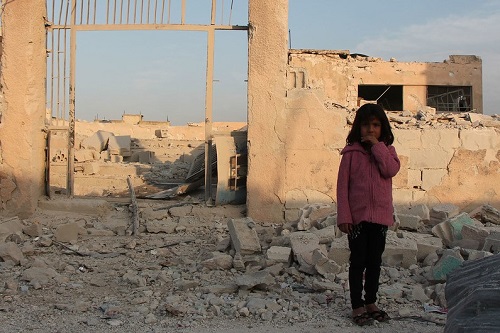unicef photo
via
UN News
A full-scale battle for Idlib must be avoided at all costs, the United Nations Secretary-General has stressed, warning that failure to do so would unleash “a humanitarian nightmare unlike any seen in the blood-soaked Syrian conflict” so far.
Speaking to the press at UN Headquarters in New York on Tuesday afternoon, Secretary-General António Guterres said that the situation in Idlib is not sustainable and underscored that the presence of terrorist groups sheltering in the enclave cannot be tolerated.
“But fighting terrorism does not absolve warring parties of their core obligations under international law.”
He called on all parties, and in particular Iran, Russia and Turkey – the three guarantors of the “de-escalation zones”, of which Idlib is the last – to “spare no effort” in protecting civilians.
“Preserve basic services and hospitals. Ensure full respect for international humanitarian law,” he urged.
The UN chief also cautioned against any use of chemical weapons, warning that, beyond the immediate human toll, such use would lead to the situation “spiralling out of control.”
Mr. Guterres also highlighted the urgent need for greater progress in the Geneva process, and the creation of a constitutional committee as part of the overall political package.
“There is no military solution to the conflict. The solution must be political,” he said.
We as humanitarian advocates must raise our voice – UN aid agencies
Earlier in the day, UN relief agencies warned the situation in Idlib risks creating the worst humanitarian tragedy of the 21st century, amid concerns that a severe funding shortfall threatens the “most vulnerable” victims of the conflict.
“We as humanitarian advocates must raise our voice,” said Jens Laerke from the Office for the Coordination of Humanitarian Affairs (OCHA). “We are saying that this has the potential to be the worst crisis – humanitarian crisis – in the 21st century, because that is frankly what it looks like, if it goes ahead with a full-scale military operation.”
Since 4 September, an uptick in violence has killed scores of civilians and displaced more than 30,000 people, Mr Laerke said.
Reading a statement from Panos Moumtzis, Regional Humanitarian Coordinator for the Syria Crisis, the OCHA spokesperson noted that aerial and ground-based bombardment had struck northern rural Hama governorate and southern rural Idlib, and had been accompanied by an increase in retaliatory rocket and mortar attacks.
The resulting impact on civilians has been “dramatic”, Mr. Laerke said, his concerns echoing those of UN Emergency Relief Coordinator Mark Lowcock, who a day earlier had issued a warning about a military escalation in Idlib, after a recent meeting with Syria government officials in the country’s capital.
“As the Emergency Relief Coordinator mentioned, he was recently in Damascus”, noted Mr. Laerke, adding that the Syrian Government had indicated it would pursue a military solution “which is very, very scary from a humanitarian perspective.”
“They have this capacity to kill and destroy,” Mr Laerke said. “We have seen it in use before, and we strongly advise that it does not happen in this enclosed area, where the population has, I think, almost doubled by the influx of evacuees and IDPs from other parts of the country.”
In the space of less than a week, four hospitals have been hit in southern Idlib and neighbouring Hama governorate.
This is contrary to international humanitarian law, the OCHA spokesperson said, adding that one of the hospitals was also in a protected “deconfliction zone”, whose coordinates had been given to the warring parties to spare it from attack.
“Our fear as humanitarians is that the worst may be ahead of us,” the statement from Panos Moumtzis read. “The safety and protection of some 2.9 million civilians residing in Idlib and surrounding areas is at risk.”
As UN agencies and their partners prepare to help those fleeing a full-scale military attack, UN Refugee Agency, UNHCR, warned that $270 million is urgently needed to help Syria’s most vulnerable people inside and outside the war-torn country.
Of more than 5.6 million Syrian refugees in Turkey, Lebanon, Jordan, Iraq and Egypt, 2.6 million are children.
UNHCR’s total funding needs for the Syria crisis amount to nearly $2 billion. So far, only 31 per cent of this has been provided.
UN News
Global perspective – Human stories. The United Nations official news service



No Comments Yet!
You can be first to comment this post!